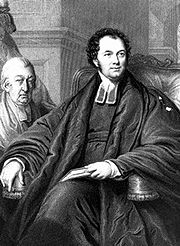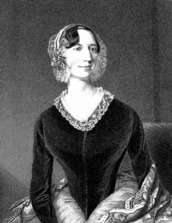
James Sherman (minister)
Encyclopedia

Congregational church
Congregational churches are Protestant Christian churches practicing Congregationalist church governance, in which each congregation independently and autonomously runs its own affairs....
and abolitionist; a popular preacher at The Castle Street Chapel in Reading from 1821 to 1836 and the Surrey Chapel, Blackfriars, London
London
London is the capital city of :England and the :United Kingdom, the largest metropolitan area in the United Kingdom, and the largest urban zone in the European Union by most measures. Located on the River Thames, London has been a major settlement for two millennia, its history going back to its...
from 1836-54. He was successor at the Surrey Chapel
Surrey Chapel
The Surrey Chapel was an independent Methodist and Congregational church established in Blackfriars Road, Southwark, London on 8 June 1783 by the Rev. Rowland Hill. His work was continued in 1833 by the Congregational pastor Rev. James Sherman, and in 1854 by Rev. Newman Hall. The chapel's design...
to Rowland Hill
Rowland Hill (preacher)
Rowland Hill A.M. , was a popular English preacher, enthusiastic evangelical and an influential advocate of small-pox vaccination. He was founder and resident pastor of a wholly independent chapel, the Surrey Chapel, London; chairman of the Religious Tract Society; and a keen supporter of the...
. Although he subsequently became known as a Congregationalist, Sherman was originally ordained to the Countess of Huntingdon's Connexion.
Association with the London Missionary Society
James Sherman was a prominent supporter of missionary work, principally the work of the non-denominational London Missionary SocietyLondon Missionary Society
The London Missionary Society was a non-denominational missionary society formed in England in 1795 by evangelical Anglicans and Nonconformists, largely Congregationalist in outlook, with missions in the islands of the South Pacific and Africa...
. The missionary Rev. Samuel Oughton
Samuel Oughton
The Rev. Samuel Oughton , Baptist missionary to Jamaica 1836-1866, and colleague of William Knibb was an ardent slavery abolitionist who became an outspoken advocate of black labour rights in Jamaica during the gradual abolition of slavery in the late 1830s and thereafter. He was briefly...
was sent to Jamaica from Sherman's Surrey Chapel
Surrey Chapel
The Surrey Chapel was an independent Methodist and Congregational church established in Blackfriars Road, Southwark, London on 8 June 1783 by the Rev. Rowland Hill. His work was continued in 1833 by the Congregational pastor Rev. James Sherman, and in 1854 by Rev. Newman Hall. The chapel's design...
in 1836; an arrangement on behalf of the Baptist Missionary Society
Baptist Missionary Society
rightBMS World Mission is a Christian missionary society founded by Baptists from England in 1792. It was originally called the Particular Baptist Society for the Propagation of the Gospel Amongst the Heathen, but for most of its life was known as the Baptist Missionary Society...
, a body that worked closely with the LMS, and practiced congregational principles of church governance.
Founding of Abney Park Cemetery
Shortly before 1840, James Sherman became a founding trustee and director of the Congregationalist's new non-denominational enterprise - Abney Park CemeteryAbney Park Cemetery
Abney Park in Stoke Newington, in the London Borough of Hackney, is a historic parkland originally laid out in the early 18th century by Lady Mary Abney and Dr. Isaac Watts, and the neighbouring Hartopp family. In 1840 it became a non-denominational garden cemetery, semi-public park arboretum, and...
.
All parts of the grounds were to be open for burial to everyone, regardless of denomination, without invidious dividing lines. It became the first garden cemetery in Europe to be wholly non-denominational in this respect whilst also having just one chapel, to be shared by everyone.
Published books

William Allen (Quaker)
William Allen FRS, FLS was an English scientist and philanthropist who opposed slavery and engaged in schemes of social and penal improvement in early nineteenth century England.-Early life:...
.
Work Towards Slavery Abolition
Of monumental political significance in the 1850s was a semi-fictional book written on one side of the Atlantic, to which James Sherman contributed an introduction written on the other. This was Uncle Tom's CabinUncle Tom's Cabin
Uncle Tom's Cabin; or, Life Among the Lowly is an anti-slavery novel by American author Harriet Beecher Stowe. Published in 1852, the novel "helped lay the groundwork for the Civil War", according to Will Kaufman....
, penned by the American Congregationalist and authoress, Harriet Beecher Stowe
Harriet Beecher Stowe
Harriet Beecher Stowe was an American abolitionist and author. Her novel Uncle Tom's Cabin was a depiction of life for African-Americans under slavery; it reached millions as a novel and play, and became influential in the United States and United Kingdom...
, with Sherman's introduction from London. The number of copies of the work, sold, was unprecedented in the history of American literature. Uncle Tom's Cabin was written in serial form for The National Era, a slavery abolitionist newspaper, in 1851. When it appeared as a two volume work by March 1852, with Rev. James' Sherman's introduction, it quickly became a work of tremendous historical significance. For the book's promotional tour in London in the early summer of 1852, Harriet Beecher Stowe
Harriet Beecher Stowe
Harriet Beecher Stowe was an American abolitionist and author. Her novel Uncle Tom's Cabin was a depiction of life for African-Americans under slavery; it reached millions as a novel and play, and became influential in the United States and United Kingdom...
, her husband, and brother Charles Beecher
Charles Beecher
Charles Beecher was an American minister, composer of religious hymns, and prolific author.Beecher was born in Litchfield, Connecticut, the son of Lyman Beecher, an abolitionist Congregationalist preacher from Boston and Roxana Foote Beecher...
, stayed at James Sherman's house. At the same time he invited the African-American escaped slave and Congregational minister Samuel Ringgold Ward
Samuel Ringgold Ward
Samuel Ringgold Ward was an African American who escaped enslavement to become an abolitionist, newspaper editor and Congregational minister....
, and assisted his stay in Britain for nearly a year, helping him raise funds for the Canadian Anti-slavery Society at a time when many escaped slaves from the USA were trying to reach freedom in British Canada.
The character of Uncle Tom was based in part on the narrative on the life of Josiah Henson, an escaped slave. It had a major effect in bringing to a head the issue of slavery abolition in the United States of America, which was resolved between the abolitionist north and pro-slavery south throughout the American Civil War. Abraham Lincoln
Abraham Lincoln
Abraham Lincoln was the 16th President of the United States, serving from March 1861 until his assassination in April 1865. He successfully led his country through a great constitutional, military and moral crisis – the American Civil War – preserving the Union, while ending slavery, and...
referred to Stowe as The little woman who started this big war. After Lincoln's death she wrote a series of biographies, including a life of Abraham Lincoln.
Thereafter James Sherman became minister at Blackheath
Blackheath, London
Blackheath is a district of South London, England. It is named from the large open public grassland which separates it from Greenwich to the north and Lewisham to the west...
Congregational Church 1854-62 and was succeeded at Surrey Chapel
Surrey Chapel
The Surrey Chapel was an independent Methodist and Congregational church established in Blackfriars Road, Southwark, London on 8 June 1783 by the Rev. Rowland Hill. His work was continued in 1833 by the Congregational pastor Rev. James Sherman, and in 1854 by Rev. Newman Hall. The chapel's design...
by the Rev. Dr. Christopher Newman Hall
Christopher Newman Hall
Rev. Dr. Christopher Newman Hall LLB , born at Maidstone and known in later life as a 'Dissenter's Bishop', was one of the most celebrated nineteenth century English Nonconformist divines...
. At Surrey Chapel
Surrey Chapel
The Surrey Chapel was an independent Methodist and Congregational church established in Blackfriars Road, Southwark, London on 8 June 1783 by the Rev. Rowland Hill. His work was continued in 1833 by the Congregational pastor Rev. James Sherman, and in 1854 by Rev. Newman Hall. The chapel's design...
, Hall continued Sherman's abolitionist cause by visiting America during the Civil War, and publishing books and making speeches to enlist British support on the side of the north: England should side with the North, he wrote, particularly because emancipation of the slaves is just.
Death & Memory
James Sherman died at his home in The Paragon, Blackheath, and was buried in a plain stone chest tomb at Abney Park CemeteryAbney Park Cemetery
Abney Park in Stoke Newington, in the London Borough of Hackney, is a historic parkland originally laid out in the early 18th century by Lady Mary Abney and Dr. Isaac Watts, and the neighbouring Hartopp family. In 1840 it became a non-denominational garden cemetery, semi-public park arboretum, and...
in Stoke Newington
Stoke Newington
Stoke Newington is a district in the London Borough of Hackney. It is north-east of Charing Cross.-Boundaries:In modern terms, Stoke Newington can be roughly defined by the N16 postcode area . Its southern boundary with Dalston is quite ill-defined too...
, London - the Congregationalist's novel non-denominational garden cemetery of which he was a founder director and trustee. His memorial stone can be seen to this day on the western boundary walk.
Books
- Sherman, James (1851) 'Memoir of William Allen', London: Charles GilpinCharles Gilpin (politician)Charles Gilpin was a Quaker, orator, politician, publisher and railway director. Amongst his many causes were the movement to repeal the Corn Laws, to establish world peace through the Peace Society, abolition of the death penalty and the anti-slavery movement, enfranchisement by providing...
- Beecher-Stowe, Harriet (1852) 'Uncle Tom's Cabin; or life among the lowly...with introductory remarks by J. Sherman', London:H.G.Bohn
- Beecher-Stowe, Harriet (1875 edn.) 'Uncle Tom's Cabin; or life among the lowly...with introductory remarks by J. Sherman', London:George Bell & Sons
- Dearing, John,(1993), The Church that would not die, Baron Birch
- Sherman, James (1829 edn.) 'A Guide to Acquaintance with God', Boston: James Loring
- Sherman, James (1850 edn.)The Pastor's Wife: a memoir of Mrs Martha Sherman, New York: American Tract Society

